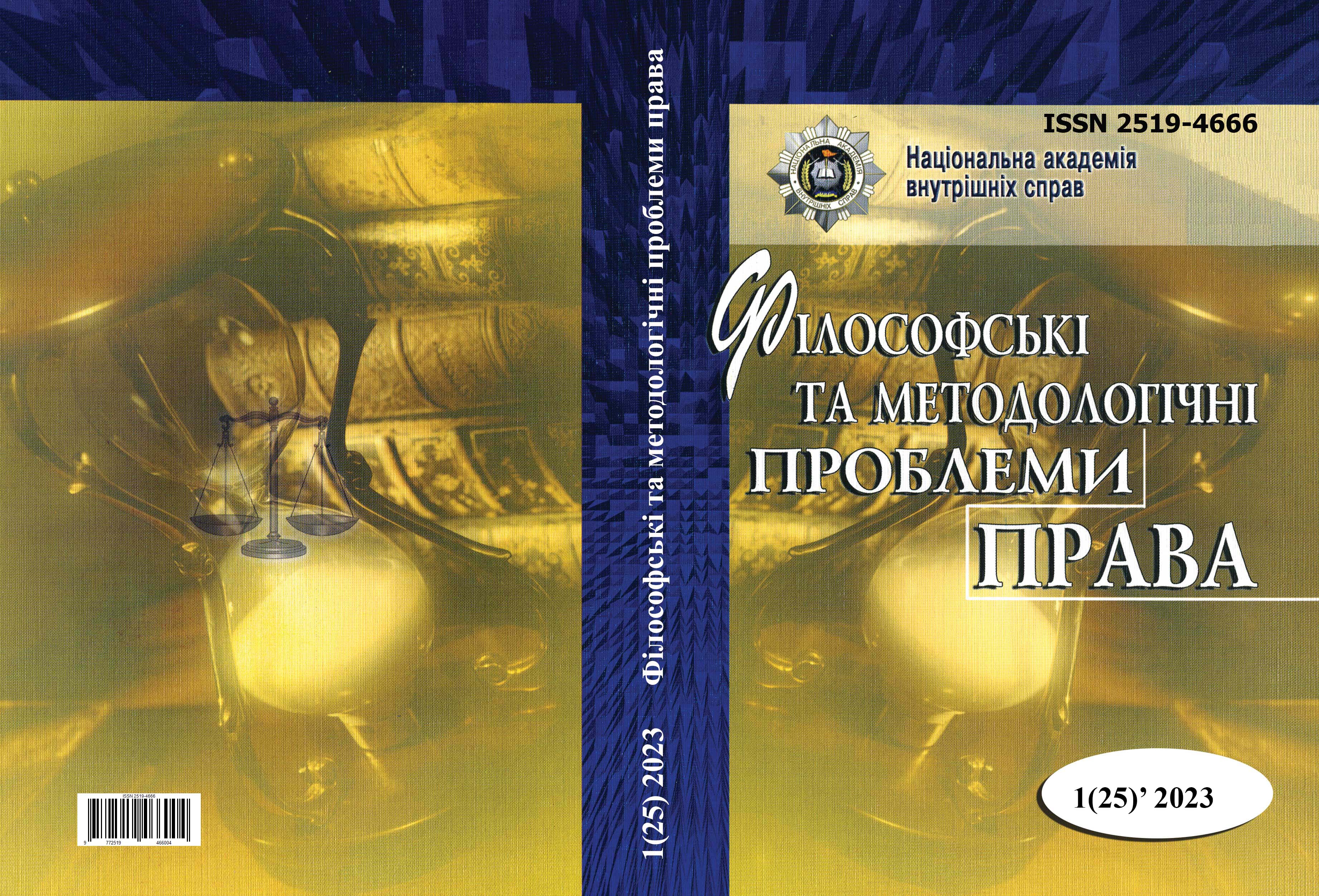Limitation of Human Rights: Philosophic and Legal Aspect
Abstract
Abstract. The problem of illegal restrictions on human rights remains relevant despite numerous scientific studies on this issue, so it is important to find new ways to solve it, which would take into account the achievements of not only legal science, but also philosophy, psychology, sociology, etc. The purpose of the article is to analyze approaches to defining the content of the concept of restriction of human rights in the philosophical and legal context. The methodological basis of the research was the ontological approach, which allows determining the nature of individual rights, in particular their limitations, axiological, systemic and anthropological methods. The scientific novelty of the publication lies in the fact that it formulates problematic issues of defining the concept of restriction of human rights depending on the type of legal understanding and research methodology, it is proposed to apply the category "essence of law" when defining an unlawful restriction of human rights. The principle position when determining the legitimate restriction of human rights is the provision regarding the inviolability of the essence of a person's rights. The practical significance of the article lies in the fact that the study of the limitation of personal rights is aimed at preventing their unlawful limitation, forming a person's legal awareness. It has been proven that human freedom is not unlimited, and therefore, when solving the question of the limits of human rights, one should determine the nature of the concept of human rights. The proposition is argued, according to which the essence of human rights consists in defining a certain minimum universal human requirements for the legal and social status of a person, which is necessary for his normal existence
Keywords: limitation of human rights; essence of human rights; content and scope of human rights; public interests
Downloads
References
Антонович М. М. Права людини за конституційним та міжнародним правом: порівняльний аспект. Наукові записки НаУКМА. 2000. Т. 18. С. 16–21. (Серія «Правничі науки»).
Білоскурська О. В., Федорчук М. Д. Нормативно-правове регулювання обмеження конституційних прав і свобод людини і громадянина в умовах воєнного стану в Україні. Правова держава. 2022. № 46. С. 7–18. doi: https://doi.org/10.18524/2411-2054.2022.46.257802.
Брюґґер В. Образ людини у концепції прав людини. Проблеми філософії права. 2003. № 1. С. 136–146. URL: http://dspace.nbuv.gov.ua/bitstream/handle/123456789/8549/31-Brugger.pdf.
Буткевич В., Речицький В. Здійснення конституційної реформи: бачення фахівців. Права і свободи та обов’язки людини і громадянина. Національна безпека і оборона. 2015. № 4–5. С. 44–48.
Дахова І. І. Обмеження реалізації прав і свобод людини: конституційне регулювання та практика європейського суду з прав людини. Forum Prava. 2018. № 4. C. 17–25. doi: http://doi.org/10.5281/zenodo.1467599.
Фігель Ю. О. Теоретичні аспекти обмеження прав людини. Вісник Національного університету «Львівська політехніка». 2016. № 837. С. 357–361. (Серія «Юридичні науки»). URL: http://nbuv.gov.ua/UJRN/vnulpurn_2016_837_59.
Финнис Дж. Естественное право и естественные права. Киев : ЮрКнига, 2021. 556 с.
Головатий С. П. Про людські права : лекції. Київ : Дух і літера, 2016. 760 с.
Філософія прав людини / за ред. Ш. Госепата, Г. Ломанна. Київ : Ніка-Центр, 2012. 286 с.
Грищук О. В. Людська гідність у праві: філософські проблеми : монографія. Львів : Львів. держ. ун-т внутр. справ, 2007. 428 с.
Грищук О. В. Філософія конституційних цінностей : монографія. Київ : ВАІТЕ, 2019. 416 с. URL: https://www.osce.org/files/f/documents/6/f/463419.pdf.
Кузніченко С. О. Концепт обмеження прав людини в умовах воєнного стану. Південноукраїнський правничий часопис. 2022. № 1–2. С. 32–36. doi: https://doi.org/10.32850/sulj.2022.1-2.6.
Matthias Mahlmann. Mind and Rights: the history, ethics, law and psychology of human rights.
Cambridge University Press, 2023. 500 р. doi: https://doi.org/10.1017/9781316875520.
Мозоль Н. І. Сучасні концепції праворозуміння: поняття, характеристика та особливості. Науковий вісник Національної академії внутрішніх справ. 2013. № 1. С. 36–41. URL: http://elar.naiau.kiev.ua/jspui/handle/123456789/3072.
Опольська Н. М. Критерії правомірного обмеження права на свободу творчості. Науковий вісник Ужгородського національного університету. 2018. № 52. Т. 1. С. 41–44. URL: dspace.uzhnu.edu.ua/jspui/bitstream/lib/44795/1/%D0%9A%D0%A0%D0%98%D0%A2%D0%95%D0%A0%D0%86%D0%87%20%D0%9F%D0%A0%D0%90%D0%92%D0%9E%D0%9C%D0%86%D0%A0%D0%9D%D0%9E%D0%93%D0%9E.pdf.
Рабінович П. М., Панкевич І. М. Здійснення прав людини: проблеми обмежування (загальнотеоретичні аспекти) : монографія. Львів : Астрон, 2001. 108 с.
Савчин М. В. Порівняльне конституційне право : навч. посіб. Київ : Юрінком Інтер, 2019. 328 с.
Терлецький Д. С. Обмеження конституційних прав: теоретико-методологічні засади. Український часопис конституційного права. 2021. № 3. С. 5–22. doi: https://doi.org/10.30970/jcl.3.2021.1.
Цвік М. Про сучасне праворозуміння. Вісник Академії правових наук України. 2000. № 4 (27). С. 3–13. URL: https://dspace.nlu.edu.ua/handle/123456789/4610.
Weber M. Selected Works 1908-1932. Meredith Long & Co., Houston TX (January 1, 1989). URL: https://www.amazon.com/Max-Weber-Selected-Works-1908-1932/dp/B00L6ZVHSM.
Abstract views: 371 PDF Downloads: 217
Copyright (c) 2023 Philosophical and Methodological Problems of Law

This work is licensed under a Creative Commons Attribution-NonCommercial-NoDerivatives 4.0 International License.
- Authors reserve the right to authorship of their own work and transfer to the magazine the right of the first publication of this work under the terms of the Creative Commons Attribution License, which allows other persons to freely distribute published work with mandatory reference to authors of the original work and the first publication of an article in this magazine.
- Authors have the right to enter into separate additional agreements on non-exclusive dissemination of the work in the form in which it was published in the journal (for example, to post an article in the institution's repository or to publish as part of a monograph), provided that the link to the first publication of the work in this journal is maintained.
- The journal's policy allows and encourages the posting of articles by authors on the Internet (for example, in electronic storehouses of institutions or on personal websites), both before the submission of this manuscript to the editorial office and during its editorial processing, as this contributes to the creation of a productive scientific discussion and positively affects the efficiency and dynamics of citing the published work.




